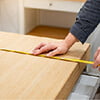15 Table Manners For Kids + Printable Placemats
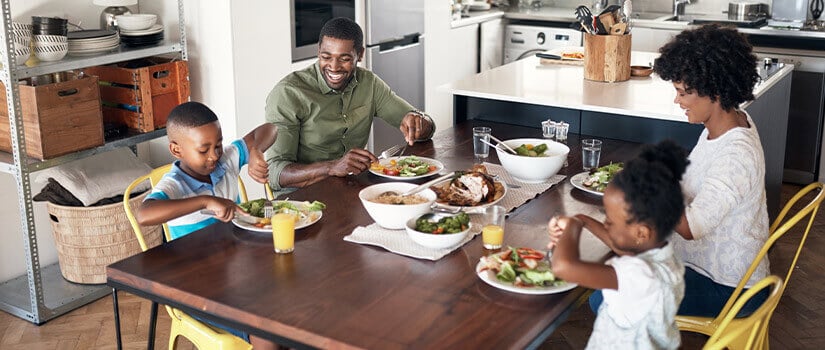
Teaching your child good manners is a lifelong skill that can help them with any social situation in the future. It also makes mealtime much more enjoyable when your little ones learn to politely stay in their seat and know how to engage in fun conversations.
Since table manners aren't an inherent trait, it can be hard to determine which ones are most important. We've created a guide that includes the most important table manners for kids to learn and how you can properly teach them.
We even include free printable table setting placemats and a table manners game as an added bonus. Most importantly, don't forget to show your kids patience throughout the process and encourage them along the way.
1. Chew With Your Mouth Closed
Chewing with a closed mouth might be easy for older kids, but it can be a challenge for your little kids. Be patient, and if your child forgets this rule, give them a gentle reminder to seal their lips as they chew their food.
You can extend this rule by telling them to chew all of their food before they speak at the dinner table. Let them know in a light-hearted way that it wouldn't be any fun if they opened their mouth to speak and food fell out onto the kitchen floor.
2. Say Please and Thank You
Teaching your children to say please and thank you is a great place to start with manners if and when they're able to start verbalizing their requests. Practice giving them examples of when to use these phrases correctly.
For example, they should always say "thank you" if someone prepared a meal for them or compliments them at the table. Also, saying "please" after asking someone to pass the food or when ordering at a restaurant is a great habit they can adopt.
3. Offer to Help Set the Table
Your kids can start setting the table once they're old enough to carry plates, glasses, and silverware on their own. Letting them help out in the kitchen before dinner is a great way to teach them where to place each dinner set item depending on the occasion.
Try out our table setting placemats to direct your children on how to set a table quickly and easily.
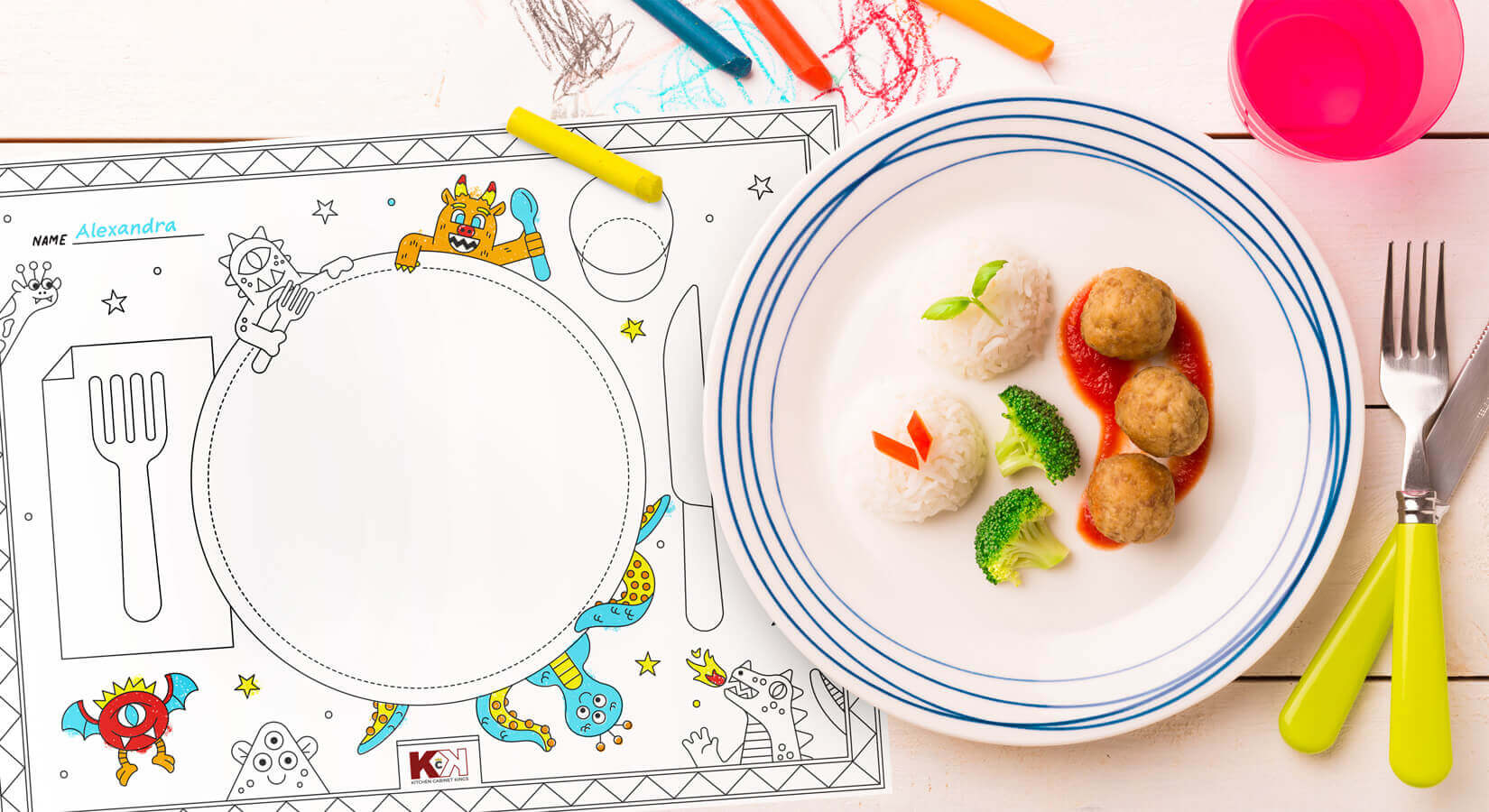

4. Avoid Criticizing the Food
Getting your toddler to try new foods can be difficult if they're going through a phase of only wanting dino nuggets and mac n' cheese. Even if they're in a picky eater stage, it's important to teach them not to criticize food served to them.
Most young children don't start to understand the concept of hurting someone's feelings until they're four or five years old. With this in mind, explain to your child that it's not nice to say bad things about a host's food. This will help them avoid embarrassing or hurting the host's feelings by shouting "Gross!" with their first bite at dinner parties.
5. Use Your Napkin Politely
It's natural for little kids to be messy eaters. Teaching them to put their napkin on their lap before diving into their food can help lessen the mess from spills.
Next, explain how they should use their napkin to wipe off their mouth and hands instead of using the sleeve of their favorite superhero costume or skirt of their princess dress. They might need some assistance at first, but with some practice, they'll learn to do it on their own in no time.
6. Learn to Use Utensils
Your kiddo will be ready to move from finger food to utensils once they develop their fine motor skills. Start by introducing a spoon with foods that will stick to it easily, so food isn't falling from it before reaching their mouth. We suggest using oatmeal or mashed vegetables for a first attempt.
Move onto a toddler-safe fork once they've mastered spoon-feeding themselves. Be encouraging and get ready to embrace a messy placemat while trying to get the hang of using utensils for the first time.
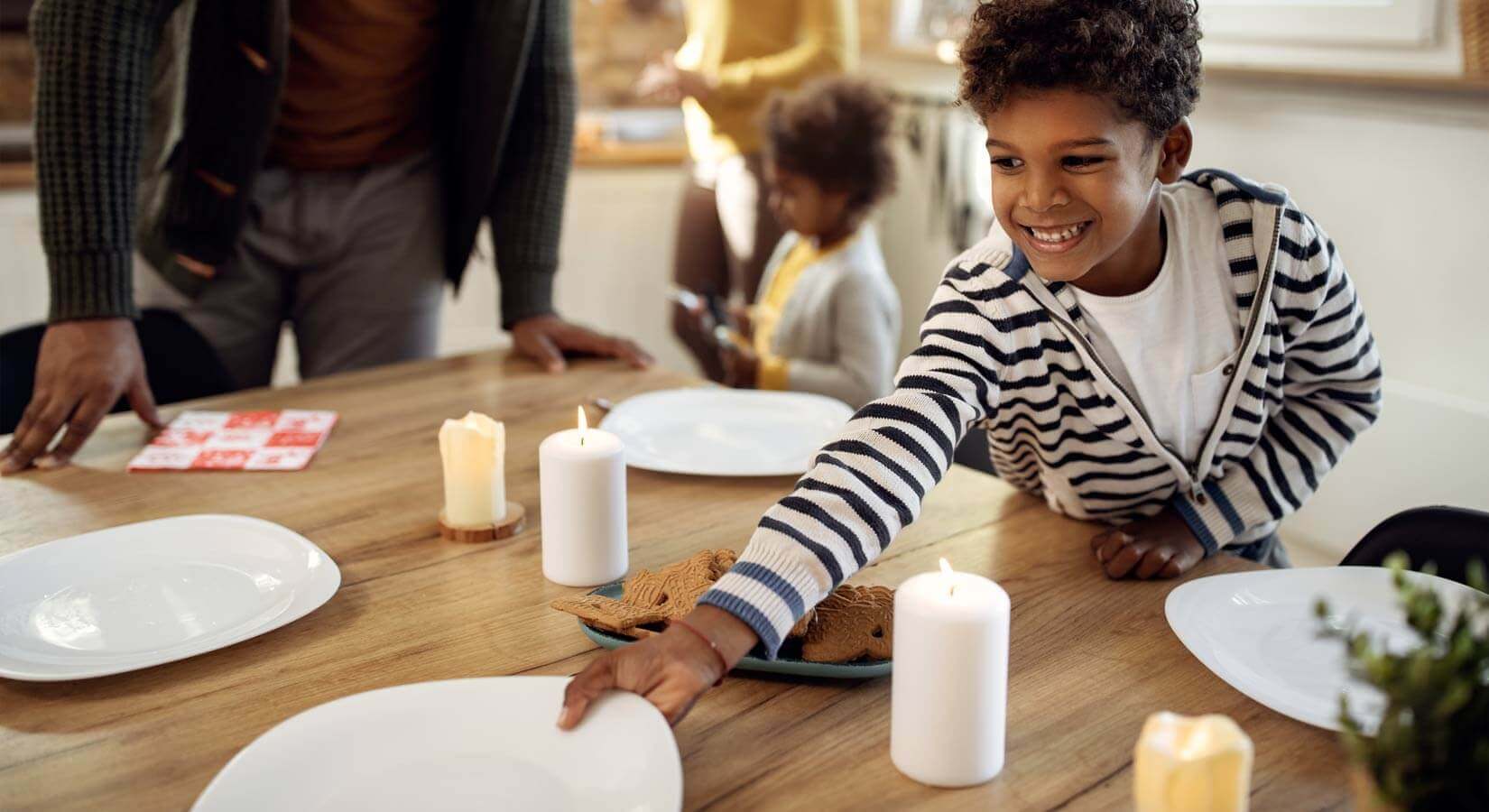
7. Wash Your Hands
Teaching your children to wash their hands before meals is a positive aspect of personal hygiene in addition to being good table manners. Remind them to clean their palms, between their fingers, back of hands, and fingernails each time they wash up.
To encourage your kids to wash their hands for the recommended 20 seconds, have them sing "Happy Birthday" or "Twinkle Twinkle Little Star" twice out loud. Singing and music will also make the experience more fun.
8. Wait Your Turn to Speak
Teaching your kids to wait their turn to speak will help them in all social situations in the long run. It's important that you don't reinforce bad behavior by giving them attention when they interrupt.
On the other hand, when your child refrains from interrupting, praise them for having patience and give them the floor to express themself. This positive reinforcement will build their confidence and encourage them to continue this behavior.
9. Avoid Reaching Across the Table
Help your little one avoid knocking over glassware or ending up with a sleeve in a side dish by teaching them to avoid reaching across the table. Teach them to politely ask other people to pass them anything out of reach.
Once kids are old enough to grasp this skill, start teaching them the correct way to pass food to guests. Traditionally, you pass food counterclockwise or left to right.
To help your kids learn their table manners in a fun way, try our Mind Your Table Manners game. Move their game piece up a space each time your child completes one of the manners listed on the chart. Give them dessert or a reward at the end of the meal if they complete enough table manners to make it to the end.
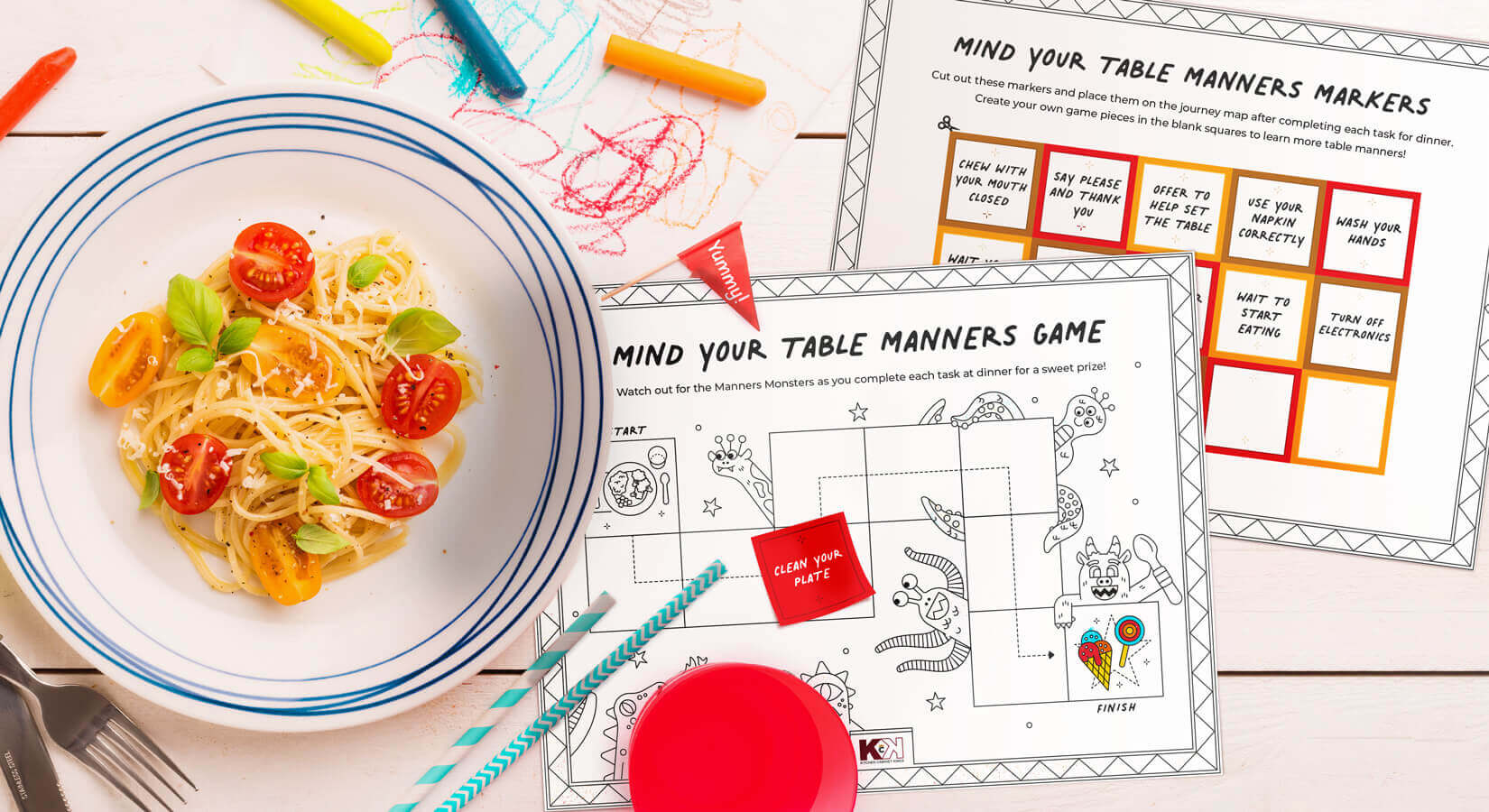

10. Ask to Be Excused
It's good practice for older children and preteens to stay seated until everyone at the table finishes their food. Unfortunately, kids under five typically have trouble sitting still for over 10 to 15 minutes.
Teach your child to respectfully ask if they can be excused from the table while you and the other adults finish your food and conversation.
11. Turn Off Electronics
No one wants to share a meal with someone who has their eyes glued to their phone or tablet. Sharing an uninterrupted meal together can help strengthen family bonds and has positive mental health implications.
Let your children know that it's impolite to be on their phones at the dining room table. A tip to keep your family off their phones and engaged is to have everyone turn their electronics on silent and set them in the center of the table until dinner is over.
12. Clean Your Plate
Enforcing the rule that everyone cleans their dishes will help teach your children responsibility and let them contribute to the household. Kids might not be thrilled at first, but it will make the dinner clean-up process much faster each night.
Show them how to clear their leftovers into the trash and rinse off their plates, utensils, and glassware. You can make the process more fun by creating an assembly line each night.

13. Wait to Start Eating
Let your child know that it's polite to wait until everyone is served food at the table to start eating their meal. Meals are best when everyone is able to enjoy them with each other.
Also, remind them that if they're at someone else's home, it's customary to wait until the host has started eating before they do. They can use the host for other social cues, such as when to put your napkin on your lap and which silverware to use as well.
14. Offer to Help
It's a great idea to get your kids in the practice of always offering to help in the kitchen. Let them assist you with age-appropriate cooking activities like setting the table, or filling water glasses.
Make sure they know that this is especially important when they are a guest in someone else's home.
15. Avoid Making Rude Noises
There's nothing more distracting at a dinner table than someone making loud noises like slurping or burping. Try to not encourage the behavior by laughing when it happens. Also, give positive reinforcement whenever they handle the situation correctly.
Mistakes happen, so if your child does make an uncontrolled noise, tell them to respectfully say "excuse me" following it.
The Benefits of Teaching Table Manners
Having good table manners will build your child's confidence and make mealtime that much more enjoyable. It's also important to have good table manners to be successful in social situations later on in life, whether that's eating at a restaurant, a friend's house, or everyday dinners.
Remember that the most important part of teaching good table manners for kids is to be patient and listen throughout the process.







